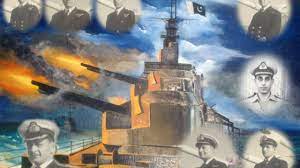Written by Ahmad Ibrahim,
“Whosoever can hold the sea, has command of everything,” this is how Themistocles (524-460 BC) encapsulated the importance of seas in the early ages. Pakistan is located in the region of vibrant political, economic, and strategic significance. The country’s 1001 kms long coastline and total maritime area of roughly 290,000 Sq Kms, offers enormous maritime potential. Although Pakistan’s immediate area of interest is the North Arabian Sea, but its extended area of interest reaches far Western Indian Ocean. The Indian Ocean offers crucial naval connectivity between East and West. The Sea Lines of Communications (SLOCs) transit through Indian Ocean Region (IOR) through several choke points. Two such crucial chock points, i.e. Strait of Hormuz, and Bab el Mandeb, fall within the Pakistan’s maritime sphere of influence. In addition, Pakistan also provides shortest naval route to land locked Central Asia, and an alternative naval connectivity to Russia and China. China Pakistan Economic Corridor (CPEC), the flagship project of China’s Belt and Road Initiative (BRI), also utilizes Pakistan’s deep port connectivity with economically and strategically important IOR. By physically linking land locked nations with Arabian Sea via Gwadar port, Pakistan is eyeing to procure maritime benefits to its maximum potential.
To safeguard maritime interests, a robust naval presence is a prerequisite for any coastal nation. Pakistan Navy (PN) is the primary custodian of Pakistan’s maritime interests’ .In brief; four key maritime interests of Pakistan can be identified. First, ensurity of national maritime connectivity with global trade routes, second, protection of regional SLOCs from all spectrum of threats; third, exercising sovereignty over territorial waters; fourth, utilization of maritime domain for economic development; and fifth, usage of maritime domain for propagating geopolitical influence.
With expanding naval sphere of influence, Pakistan Navy is also evolving to counter and deter the diversifying threat spectrum. On one axis, PN has to maintain power equilibrium against a much larger Indian Navy; on the other axis, PN has to deal with low intensity threats like piracy, maritime terrorism, sea-borne smuggling etc. for the enforcement of law and order. Therefore, the PN has to retain a posture flexible enough to thwart multitude of threats.
The primary source of hostilities to Pakistan’s maritime interests is its Eastern neighbor-India. Both states are historic rivals and share contrasting interests. In recent past, India has assertively increased its naval outreach in IOR. The rapid expansion of Indian Navy, both in terms of tonnage and capability, is directed to ensure Indian dominance in IOR. Besides naval theater, India has exercised hostile geo-economic policies to diminish the scope of Pakistan’s maritime economy. India is also assertively maturing its sea borne nuclear strike capability. These destabilizing measures can disturb the regional balance of power, can intensify the regional security dilemma, and can trigger arms race which often yield overconsumption of economic resources.
India’s hegemonic naval ambitions pose existential threats to Pakistan’s maritime interests. Albeit, limitations are there, but Pakistan has taken necessary measures as per its doctrinal requirements. Instead of competing on numeric basis, PN has focused more on force synergy and network centricity to better synchronize its sea denial combat posture. By reinforcing its conventional defenses, and developing of sea borne nuclear strike capability, PN is enroute to manifest sustainable full spectrum deterrence in the maritime theater.
To counter threats of low end spectrum, PN has taken several unilateral and multilateral measures.PN is part of several collaborative security measures, e.g. Task Force 150 (TF-150) for counter terrorism, and Task Force 151 (TF-151) for counter piracy operations. In recent past, PN has also commenced Regional Maritime Security Patrol (RMSP) for accomplishing international obligations of ensuring law & order in IOR. These measures have helped to mitigate low intensity threats in Pakistan’s maritime area of interest and have profoundly elevated country’s status as a responsible actor in the maritime arena.
Besides the security, PN has also undertaken maritime diplomacy for supporting national interests. This involves the conduction of multilateral naval exercises, execution of port visits, participation in combined tasks forces and providence of humanitarian and disaster relief. The conduction of multilateral AMAN naval exercise is the most eminent example. The core objective of this maritime diplomacy is to deepen relationship with other regional and extra-regional powers in order to persuade national interests, spread maritime awareness, and deter the adversaries.
Indian Ocean is rapidly transforming into a competing ground for power politics. With BRI project, China is growing its global footprint —particularly in Asia-Pacific region. In counter, United States has formulated Quad Alliance with Japan, Australia and India, to confine Beijing’s options in Western Pacific as well as Indian Ocean. This complicates the future regional strategic equation. On one side, Islamabad has to retain a balance of interests between Beijing and Washington, while on other side it has to instigate its naval prowess to safeguard its diversifying maritime interests. Therefore, the key will be how efficiently Pakistan will synchronize its maritime interests and doctrinal posture with the variabilities of geo-strategic realities to emerge as a pivotal player in this region.
Trending
- Annual Sports Gala and All Pakistan Football Championship kick-started at UoS
- RCCI organizes a Think Tank Session on the Economy of Pakistan and Future Challenges
- Minister Lipavský meets Bajramov Foreign Minister Azerbaijani
- Bhawalnagar Incident: Lessons for Pakistan
- Kashmore turned into crime industry
- UK Higher Education Delegation Strengthens Educational Bonds with Pakistan
- The Influence of Social Media on Today’s Youth
- Sardar Abdul Qayyum Niazi meets Secretary General PTI Omar Ayub

